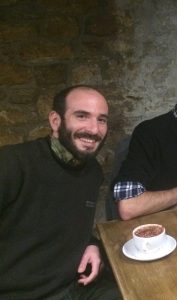Student Reflections: Antonino Scalia
Antonino Scalia, who joined us from Sicily, completed the MLitt in Transnational, Global and Spatial History in 2016. His coursework included a study of the impact and reception of the Greek Colonels coup in Italian culture and research on the manifestation of Palestinian causes in Italian theatre. In the skills module, he developed maps that visualised the distribution of political violence in Italy, 1969-1982, and developed a historical database of 588 Italian left-wing prisoners in order explore connections between across a range of attributes. He completed the degree with a masters dissertation entitled, “Encounters across borders. Left-wing Italian and Greek activists (1967-1974)”
My experience as a former student in the MLitt in Transnational, Global and Spatial History has been highly positive because of the welcoming environment, the stimulating style of teaching (and learning) and the fitting training it provided to meet the challenges of 21st History writing.
To start with human relations, in my view the friendly course’s staff attitude towards students was both able to mitigate stress from academic work and boost the quality of scientific output. In fact, being treated on an informal and equal basis worked for me as a strong incentive and help to overcome initial anxieties, insecurities and obstacles that derived from being accustomed to a totally different educational system. Moreover, the Master’s experience proven to me just how much the quality of research also depends on the quality of dialogue with other scholars. Therefore, a welcoming environment such as the one that is found at the School of History in St Katharine’s Lodge was also conducive to raising the level of one’s scholarly performance.
A second major strength of the Mlitt, which is solidly grounded on its friendly atmosphere, is its style of teaching, which is based on discussion and collaboration as an approach for progressing in historical research. Classes, seminars, writing workshops and “surgery hours” have been fruitful moments of debate with lecturers and other students. It resulted very often in the development of new ideas or the refinement of old ones. The countless chances for dialogue offered by the programme – even in form of one-to-one conversations – profoundly contributed to my intellectual progress.

Finally, the formula could not have been completed if the relaxed, fertile atmosphere and the attention to dialogue had not been combined with a serious training. This included, amongst others, an emphasis on theoretical approaches to history, the teaching of cutting-edge methodologies and the study of a very large set of subjects. Particularly, the considerable importance given to theoretical issues made me fully aware that historical writing must first and foremost include a strong reflexive component. Also, research about the past is a practical undertaking and the introduction to innovative methods such as the ones connected with digital humanities (maps and databases) kept me and my colleagues in pace with the on-going, rapid transformations that the discipline is experiencing. Finally the multiple geographical and thematic areas covered by the Mlitt’s lecturers are important tools for becoming global and/or transnational historians in the full sense of these words. Indeed, I think that these approaches require intellectual curiosity and the will to find inspirations in realms which are (even if only apparently) far away from one’s own interests.
After this year in the MLitt, I am persuaded that the combination of each of the abovementioned elements has positively influenced my evolution as a scholar. As a result, I would highly recommend the master program to anyone who, like me, intends to pursue a career in historical research.
